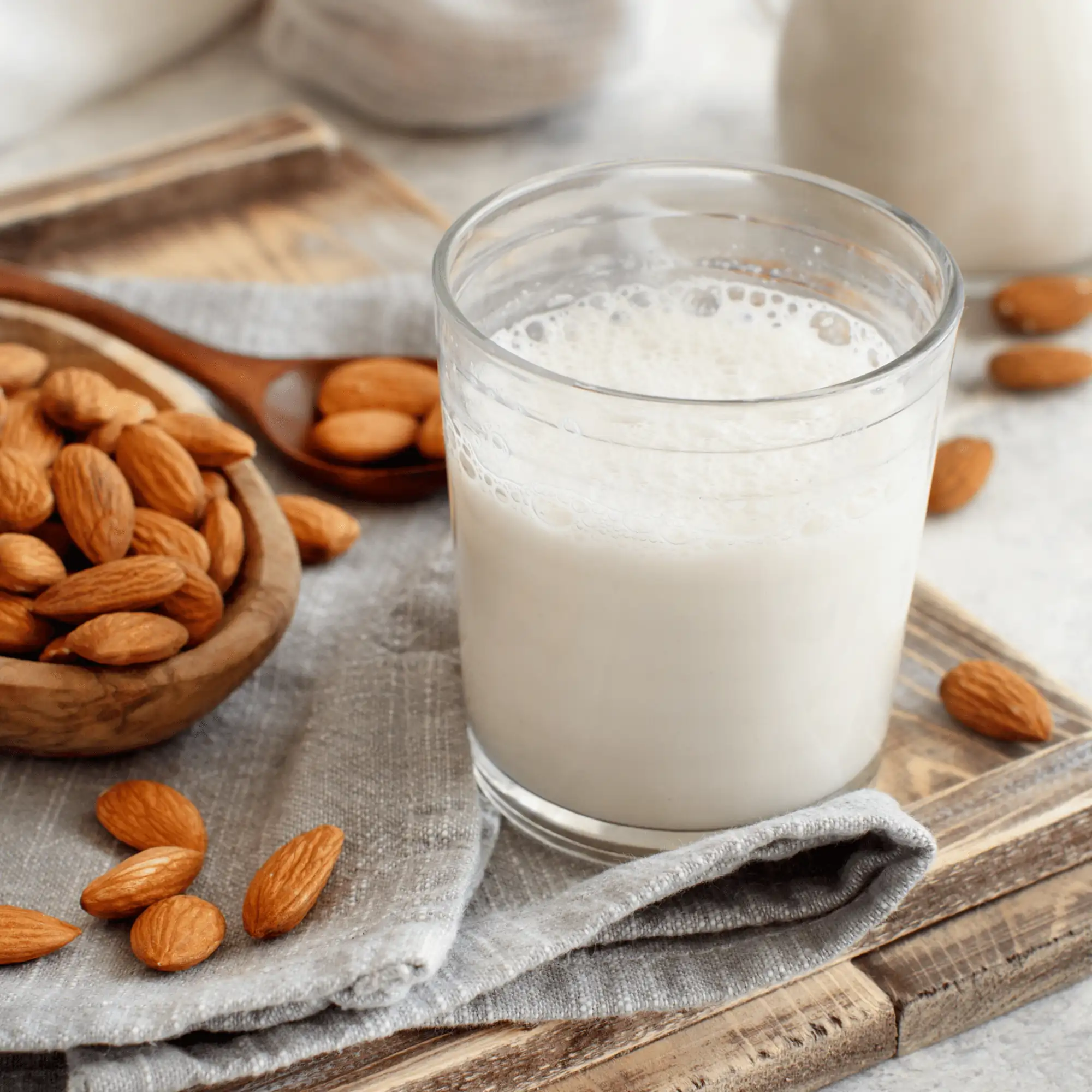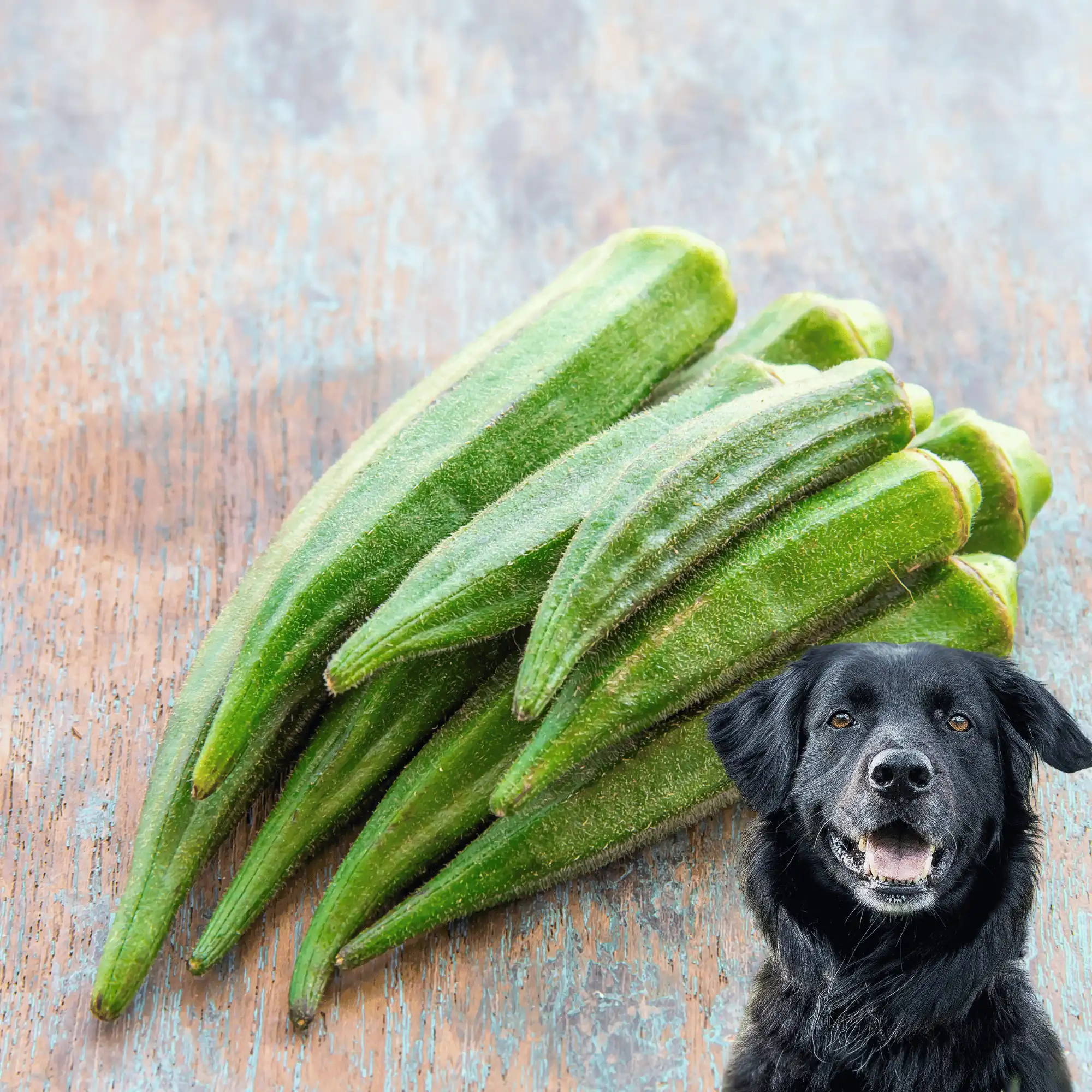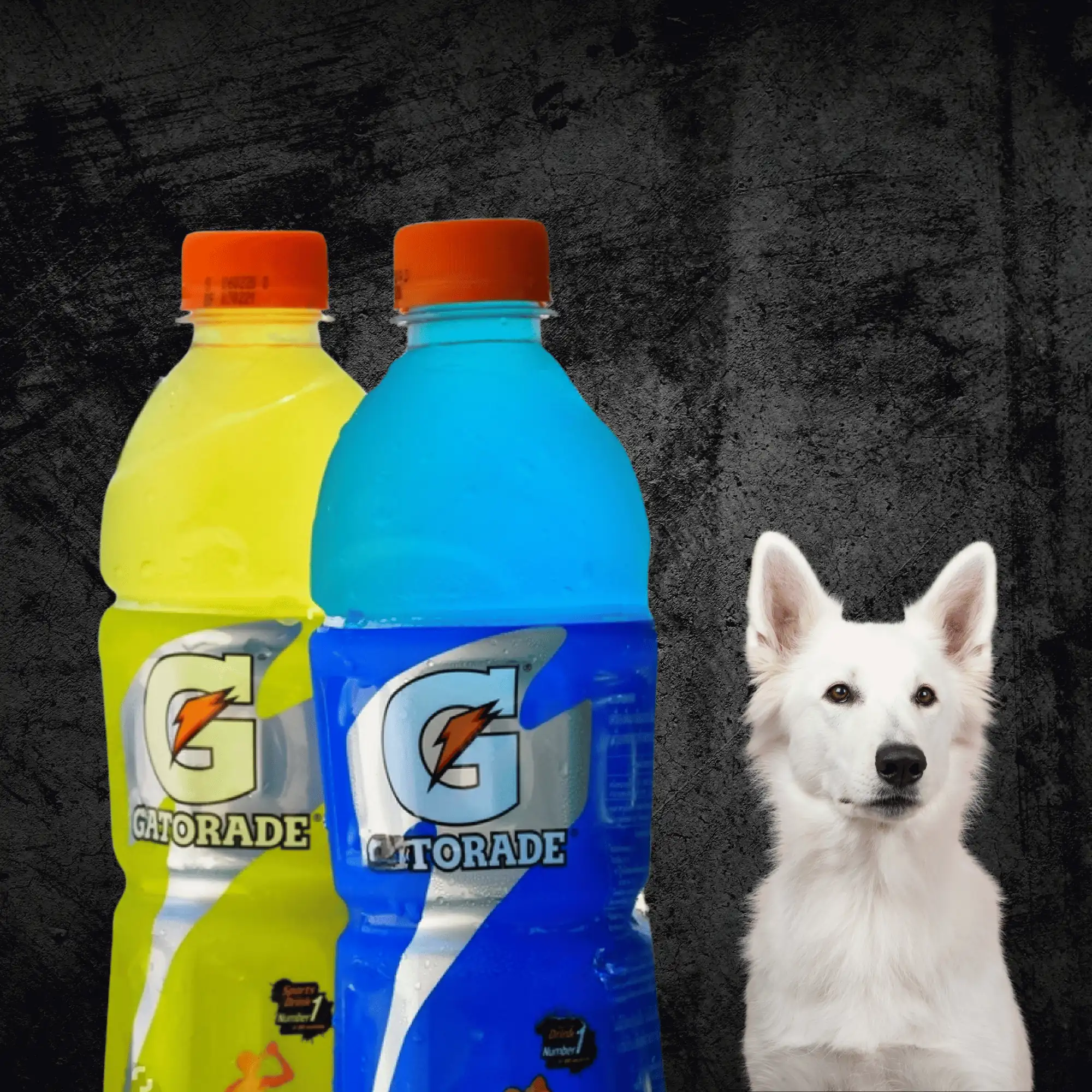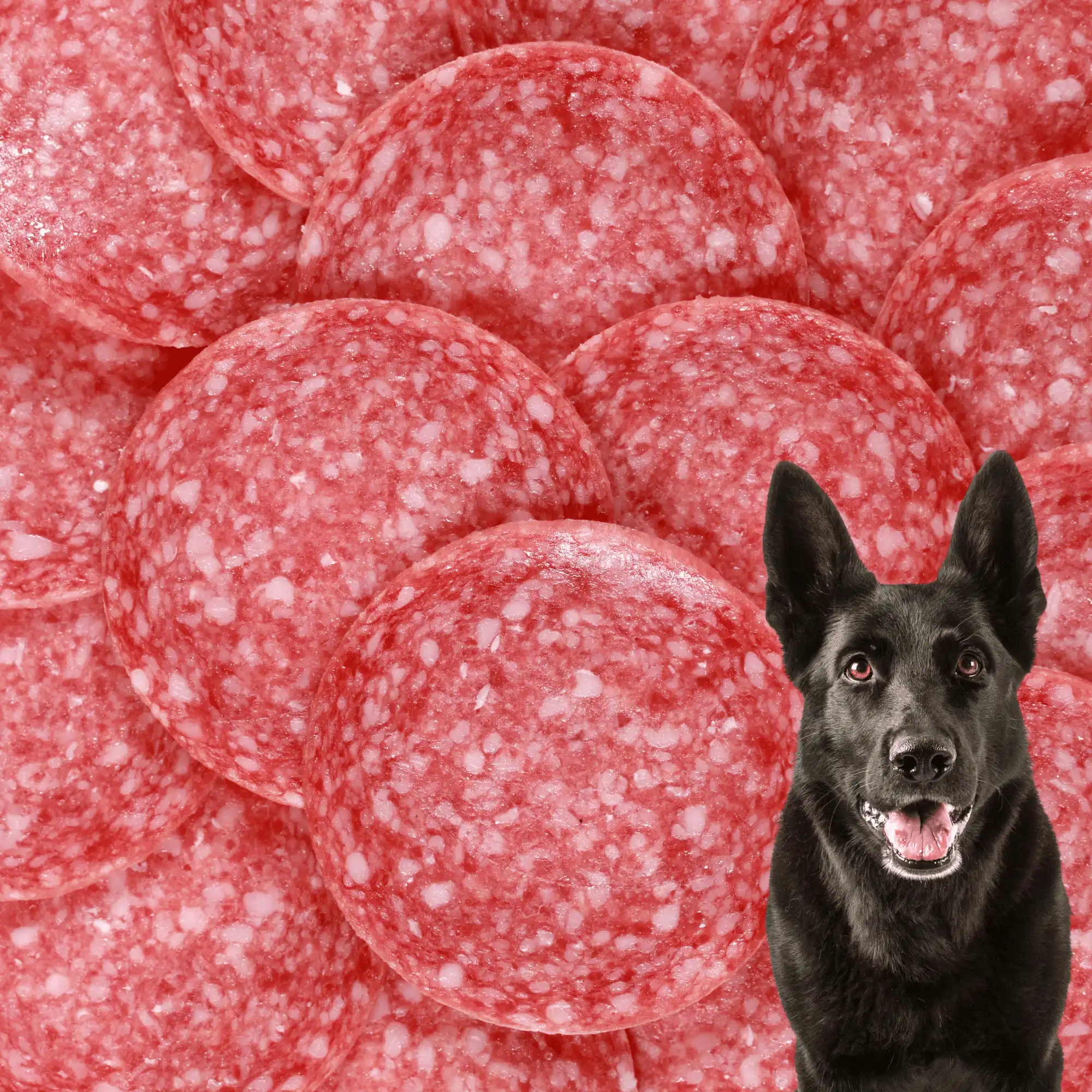As pet owners, we often seek to provide our furry friends with the best care and nutrition. With the increasing popularity of plant-based milk alternatives among humans, questions arise about whether these alternatives are suitable for our dogs. Almond milk, in particular, has garnered attention as a dairy-free option, but its safety and suitability for canine consumption warrant closer examination.
In this article, we’ll delve into the question: Can dogs drink almond milk? We’ll explore the potential risks, nutritional considerations, and safe alternatives to ensure responsible pet ownership and the optimal health of our beloved dogs.
In this blog post, we’ll delve into the following topics:
- Why is Cow Milk not Ideal for Dogs?
- Can Dogs Drink Almond Milk?
- Benefits of Almond Milk for Dogs
- Risks of Almond Milk for Dogs
- How to Select Almond Milk for Your Dog?
- Create Your Own Almond Milk
- Symptoms to Keep an Eye On
Why is Cow Milk Not Ideal for Dogs?

Dogs may enjoy the taste of dairy milk, but it’s not advisable to include it regularly in their diet. Many dogs lack the lactase enzyme needed to digest lactose in milk, making them lactose intolerant. This means they may struggle to digest milk and other dairy products.
Additionally, traditional dairy milk often contains high levels of fat and sugar, along with potential traces of pesticides and antibiotics. These components can pose health risks to dogs if consumed regularly.
Thankfully, there are plenty of alternatives to traditional cow’s milk that can be given to your furry friend. One such option is almond milk. But can dogs safely enjoy almond milk? Well, the answer isn’t straightforward.
Can Dogs Drink Almond Milk?
A moderate amount of almond milk is generally considered safe for your dog. However, it’s worth mentioning that almond milk is calorie-dense, so it’s best not to give it to your dog too often.
Jordan almond milk may cause digestive issues, especially if your dog has a sensitive stomach or is prone to allergies. Additionally, some almond milk brands contain xylitol, a sweetener that is toxic to dogs. Always check the ingredient label before giving almond milk to your dog, and opt for unsweetened varieties to avoid potential risks.
If you’re unsure or if your dog has any underlying health conditions, it’s best to consult with your veterinarian before introducing almond milk or any new food to your dog’s diet.
Benefits of Almond Milk for Dogs:
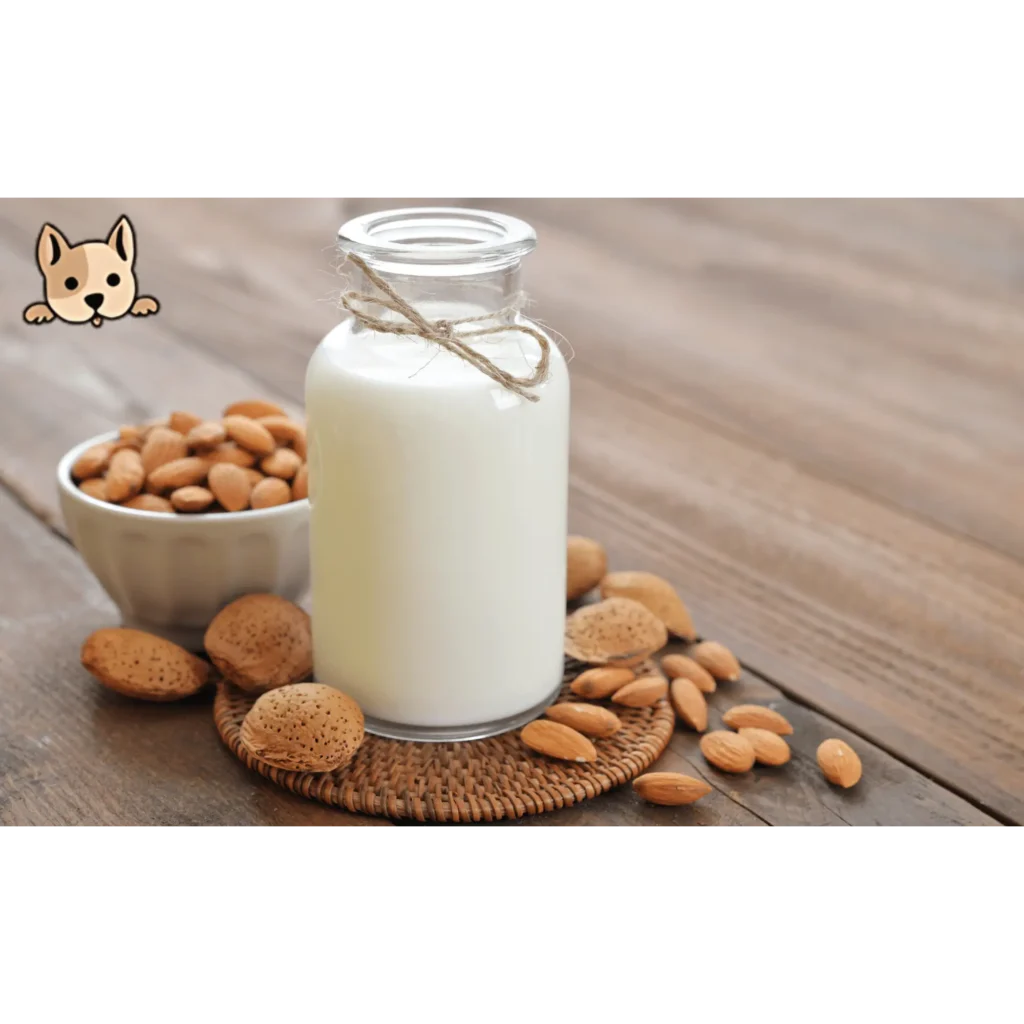
Almond milk can be a suitable alternative for lactose intolerant dogs or cow’s milk allergies. Here are some potential perks of almond milk for dogs:
1. Lactose-Free:
One significant benefit of plant-based milk for dogs is that it is lactose-free. This is particularly advantageous for dogs with lactose intolerance, a condition where they lack the enzyme needed to digest lactose, the sugar found in cow’s milk.
Almond milk provides a dairy-free alternative that won’t upset their stomachs or cause digestive issues. This makes it a suitable option for dogs with sensitivities to dairy products, allowing them to enjoy a tasty beverage without discomfort.
2. Hypoallergenic:
Another benefit of almond milk for dogs is its hypoallergenic properties. Some dogs may have allergies to proteins found in cow’s milk, leading to allergic reactions such as itching, skin irritation, or digestive upset.
Almond milk offers a hypoallergenic alternative, as it does not contain the same proteins that can trigger these allergic responses. This makes almond milk a safer option for dogs with known or suspected milk allergies, allowing them to enjoy a nutritious beverage without adverse reactions.
3. Nutrient Content:
Almond milk also offers beneficial nutrient content for dogs. While it may not naturally contain as many nutrients as cow’s milk, some varieties are fortified with essential vitamins and minerals, such as calcium and vitamin D.
These nutrients are crucial for maintaining strong bones and overall health in dogs. By choosing almond milk fortified with these nutrients, pet owners can ensure their dogs receive additional nutritional support as part of their diet.
4. Low in Calories:
Another advantage of almond milk for dogs is that it is typically low in calories. Compared to cow’s milk, which can be higher in calories and fat, almond milk offers a lighter alternative. This can be beneficial for dogs who need to manage their weight or have dietary restrictions.
By incorporating almond milk into their diet in moderation, pet owners can help their dogs maintain a healthy weight and overall well-being without excessive calorie intake.
5. Vitamin B2:
Almond milk can be a source of vitamin B2, also known as riboflavin. Vitamin B2 is essential for various bodily functions in dogs, including energy production, metabolism, and maintaining healthy skin and coat.
While almond milk may not contain as high levels of vitamin B2 as some other foods, it can contribute to a dog’s overall intake of this important nutrient when consumed as part of a balanced diet.
Despite these potential benefits, it’s essential to exercise caution when feeding almond milk to dogs. Some dogs may have trouble digesting almonds or may be allergic to them. Additionally, almond milk should not be a primary source of nutrition for dogs and should only be given in moderation.
Risks of Almond Milk for Dogs:
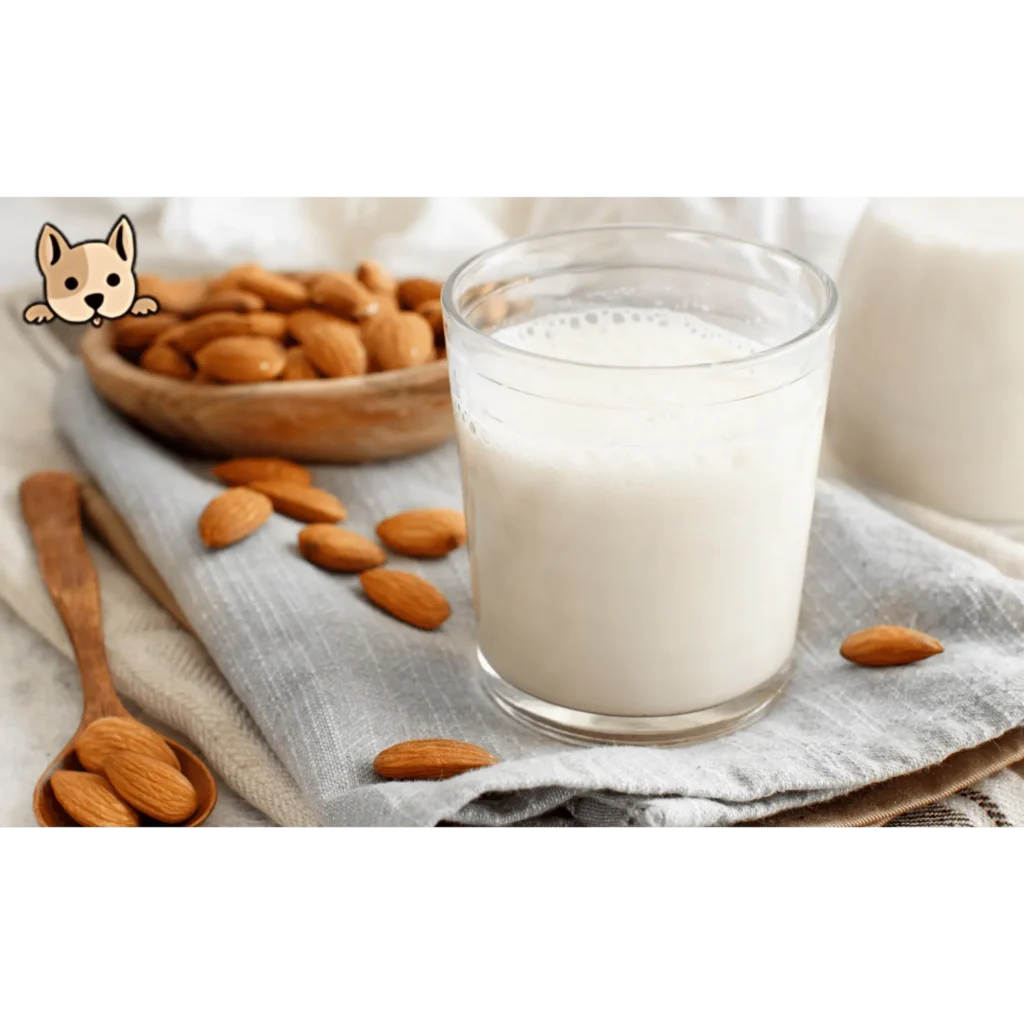
While almond milk can offer benefits for some dogs, there are also potential drawbacks and considerations to be aware of:
1. Nutritional Imbalance:
Almond milk lacks certain nutrients that dogs need, such as protein and specific vitamins and minerals. Relying solely on almond milk for your dog’s nutrition may result in deficiencies if not supplemented with a balanced diet.
2. Xylitol poisoning:
Xylitol poisoning is a serious risk associated with almond milk for dogs. Xylitol, a sweetener found in some almond milk brands, can cause a rapid drop in blood sugar levels and lead to severe health issues, including liver failure. It’s crucial to check almond milk labels for xylitol and avoid giving any product containing it to your dog to prevent poisoning. If ingestion occurs, seek veterinary help immediately.
3. Potential digestive issues:
Almond milk may cause digestive issues in some dogs. While it’s generally easier to digest than cow’s milk, almonds can still lead to stomach upset, including vomiting or diarrhea. Monitor your dog closely after giving them almond milk, and consult a vet if problems occur.
4. Allergic reactions:
While almond milk is hypoallergenic for many dogs, some canines may still be allergic to almonds or other ingredients in the milk. Allergic reactions can manifest as itching, skin irritation, swelling, or gastrointestinal problems.
5. Caloric intake:
Although almond milk is lower in calories than cow’s milk, it still contains calories. Feeding excessive amounts of almond milk to dogs, especially those prone to weight gain, can contribute to obesity and related health issues.
To mitigate these risks, it’s essential to offer almond milk to dogs in moderation and as part of a balanced diet. Consult with a veterinarian before introducing almond milk or any new food to your dog’s diet, especially if your dog has specific dietary needs or health concerns.
How to Select Almond Milk for Your Dog?
When choosing almond milk for your dog, there are some simple steps you can follow to make sure it’s safe and healthy for them.
Firstly, take a close look at the label. Check the ingredient list to ensure there’s nothing harmful in the almond milk, such as xylitol, chocolate, or caffeine, which can be dangerous for dogs if ingested.
Opt for unsweetened almond milk. Avoid varieties with added sugars or artificial sweeteners, as these can upset your dog’s stomach and may even be toxic to them.
Stick to plain almond milk. Flavored options like chocolate or vanilla might contain additional ingredients that aren’t safe for dogs, so it’s best to choose plain varieties.
Consider whether the almond milk is fortified with vitamins and minerals. Some brands add extra nutrients like calcium and vitamin D, which can be beneficial for your dog’s health. Just make sure the levels are appropriate for your dog’s diet.
If possible, choose organic or natural almond milk. These options tend to have fewer chemicals and additives, making them safer for your dog to consume.
Think about your dog’s specific dietary needs and any allergies or sensitivities they may have. Select almond milk that doesn’t contain any ingredients that could trigger an adverse reaction.
Lastly, it’s always a good idea to consult with your veterinarian before introducing almond milk or any new food to your dog’s diet. They can provide personalized advice based on your dog’s individual health needs and help ensure that the almond milk you choose is safe for them to consume.
By following these steps, you can select almond milk that’s both safe and suitable for your dog to enjoy as an occasional treat or dietary supplement.
Create Your Own Almond Milk:
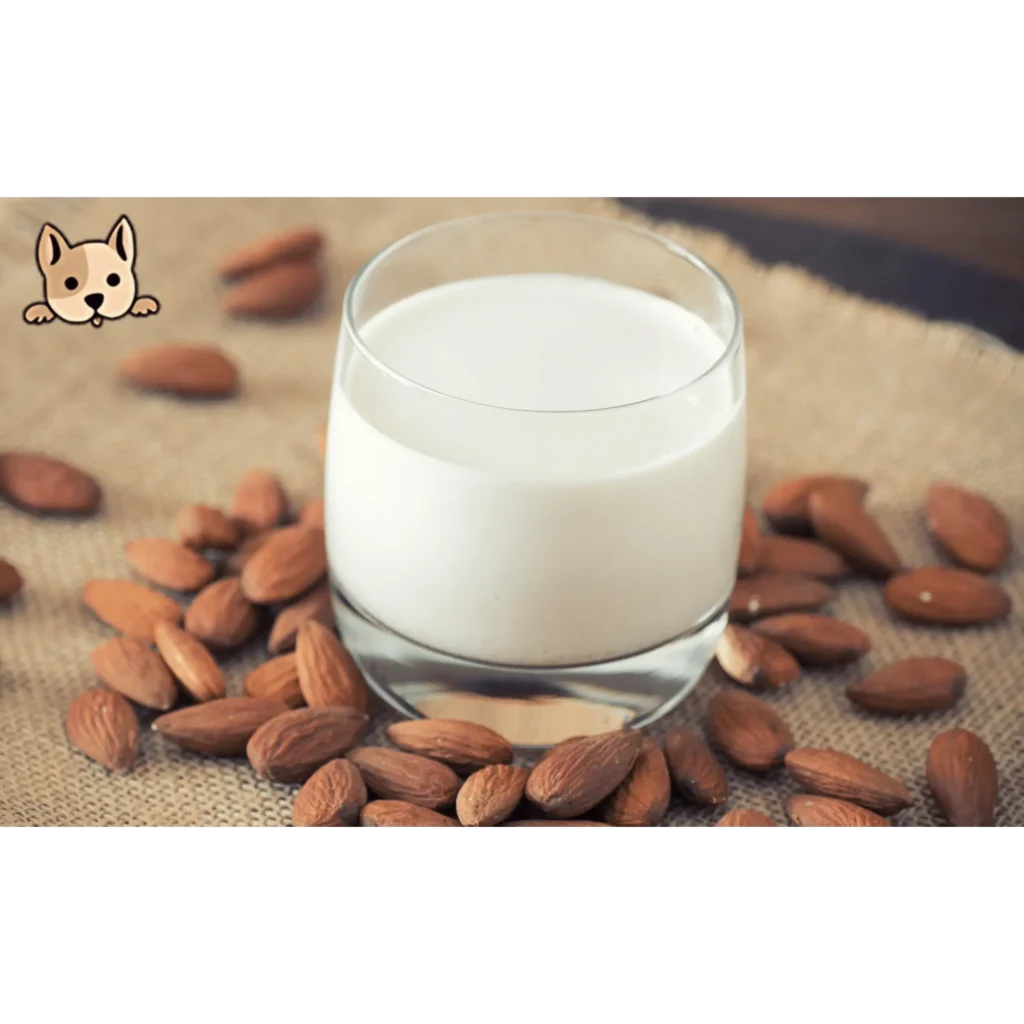
For safe and nutritious almond milk free of unhealthy additives like xylitol, sugar, or carrageenan, why not try making your own? All you need are almonds, a blender, and cheesecloth. Here’s how:
- Soak a cup of almonds in water for 1-2 days.
- After draining and rinsing the almonds, blend them with two cups of water until they form a paste. You don’t need to peel the almonds!
- Place a cheesecloth over a bowl and transfer the almond paste into it.
- Gather the cheesecloth around the paste and squeeze the milk out into the bowl.
Now you have a safe and easy way to make almond milk for your dog, ensuring you avoid harmful additives and sugars found in commercial products.
Symptoms to Keep an Eye On:
If your dog consumes almond milk containing xylitol, it’s crucial to monitor for potential symptoms indicating xylitol toxicity. These symptoms may include:
- Vomiting
- Fatigue
- Seizures
- Weakness
- Collapse
- Tremors
- Jaundice
- Breathing difficulties
- Elevated heart rate
- Blood clotting disorders
If your dog exhibits any of these symptoms after consuming almond milk or any product containing xylitol, it’s essential to seek immediate veterinary care.
Final Thought:
While almond milk can be a viable alternative for dogs with specific dietary needs or allergies, it’s essential to approach its inclusion in their diet with caution. Understanding both the potential benefits and risks associated with almond milk allows pet owners to make informed decisions regarding their dog’s nutrition and well-being.
When offering plant-based milk to your dog, always opt for unsweetened varieties without harmful additives like xylitol. Additionally, remember that almond milk should not replace a balanced diet tailored to your dog’s nutritional requirements. Consulting with a veterinarian is advisable, especially if your dog has underlying health conditions or dietary sensitivities.
By prioritizing your dog’s health and making thoughtful choices about their diet, you can ensure they enjoy a happy, healthy life free from unnecessary risks. Whether it’s almond milk or any other dietary consideration, responsible pet ownership entails staying informed and prioritizing your pet’s welfare above all else.
FAQs:
1. How much almond milk can I give my dog?
Giving your dog a moderate amount of almond milk is safe, but keep in mind that it’s calorie-dense and shouldn’t be a regular part of their diet. Always check the ingredients to make sure it doesn’t contain xylitol.
2. What type of milk can dogs drink?
Both regular milk and lactose-free milk, along with other dairy products like cheese and ice cream, contain fat and should only be given occasionally in small amounts as treats. Puppies can safely consume small amounts of plant-based milk, such as soy milk, coconut milk, and almond milk.
3. What kind of milk is not allowed for dogs?
While whole milk isn’t advisable for dogs, sharing milk alternatives like almond milk, oat milk, soy milk, and coconut milk isn’t recommended either. Despite being plant-based, these milks are typically high in calories and fat, which are not necessary for Fido’s diet.
4. Is coconut milk OK for dogs?
Coconut milk is not toxic to dogs and can even provide some health benefits, including boosting the immune system, freshening their breath, and enhancing the appearance of their coat. However, excessive consumption of coconut milk or coconut milk-based foods may lead to diarrhea or loose stools in your dog.






